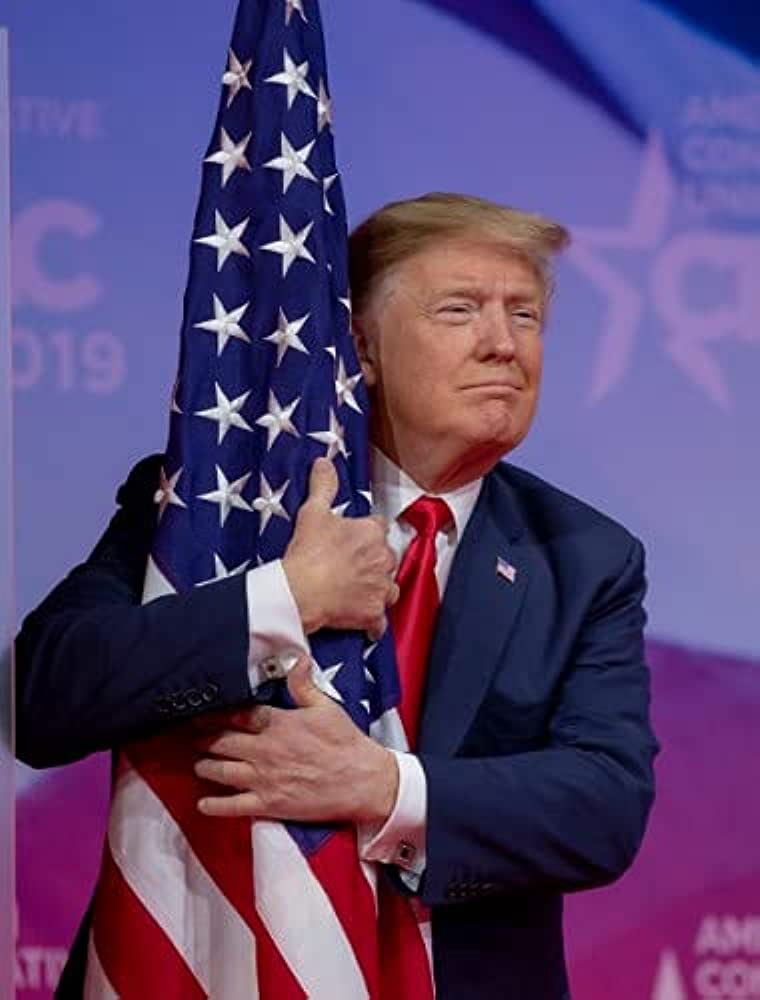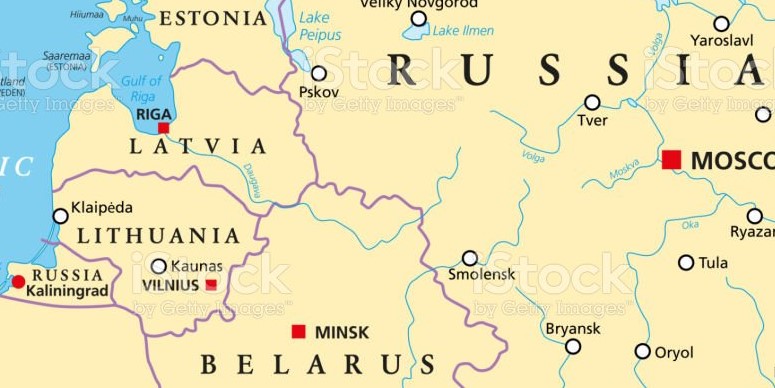Posted on March 4,
2023
Or Else What?
No, Trump did not deter the Russians
by
Daniel
Clark
If there's one thing that everyone seems to know about
the war in Ukraine, it's that the Russians would never have invaded if Donald
Trump had been president. In fact, it's
such an absolute certainty that nobody ever feels the need to explain why. But if you had to explain it, how could you?
The simple fact that Russia did not invade Ukraine
during the Trump presidency is not itself very convincing. To this point in the Biden administration,
China has not invaded Taiwan. Does this
mean the Chinese are afraid of Biden?
North Korea has not launched a missile strike into South Korea. Do the North Koreans fear Biden, also? We have no idea how many variables factored
into Vladimir Putin's timetable for invading Ukraine. It might be that the only reason he didn't do
it during the Trump years is because Trump did not win a second term.
 A
deterrent, by definition, is an implied consequence that dissuades another
party from acting. There were supposed
to have been consequences in 2019, when Iran shot down an American drone over
international waters, but a funny thing happened on the way to the retaliatory
strike: nothing. "We were cocked &
loaded to retaliate last night on 3 different sights [sic] when I asked, 'How
many will die?'" the president tweeted.
"'150 people, sir' was the answer from a General. 10 minutes before the strike I stopped it,
not proportionate to shooting down an unmanned drone." That might have been a perfectly reasonable
deliberation had he made it behind closed doors, far earlier in the process, as
he surely had the opportunity to do.
It's unthinkable that he was so incurious about the effects of his own
decision until the very last moment. What
happened instead is that he had already made a well informed decision to launch
a strike, but then got cold feet just minutes beforehand. What's more, he did it in full view of the
entire world.
A
deterrent, by definition, is an implied consequence that dissuades another
party from acting. There were supposed
to have been consequences in 2019, when Iran shot down an American drone over
international waters, but a funny thing happened on the way to the retaliatory
strike: nothing. "We were cocked &
loaded to retaliate last night on 3 different sights [sic] when I asked, 'How
many will die?'" the president tweeted.
"'150 people, sir' was the answer from a General. 10 minutes before the strike I stopped it,
not proportionate to shooting down an unmanned drone." That might have been a perfectly reasonable
deliberation had he made it behind closed doors, far earlier in the process, as
he surely had the opportunity to do.
It's unthinkable that he was so incurious about the effects of his own
decision until the very last moment. What
happened instead is that he had already made a well informed decision to launch
a strike, but then got cold feet just minutes beforehand. What's more, he did it in full view of the
entire world.
"North Korea best not make any more threats to the
United States," Trump said in August of 2017.
"They will be met with fire and fury like the world has never
seen." By the end of that year, the
Norks had resumed nuclear testing. In
2019, they restarted their provocative missile launches into the Sea of
Japan. Kim Jong Un boasted of creating a
"new strategic weapon" and suggested he might deliver America a "Christmas
present." No fire, no fury. Not that
there necessarily should have been, but he had very publicly promised that
there would be.
None of this comes as any surprise or disappointment
to Trump's most ardent supporters. If
anything, they would have more likely turned against him had he ever backed up
his threats, because his "America first" platform is perversely characterized
by a simple-minded peacenik foreign policy that shrinks from the projection of
American power. Trump's son, Donald Jr.,
boasted that "Donald Trump is the first president in modern history who did not
start a new war." Oh, is that how
America has gotten involved in wars in the past? Because our presidents "start" them? That's not a very America-firsty point of
view, but it is the one to which he, tragically, has led most of the Republican
Party.
President Trump has actually surrendered a war on
America's behalf, needlessly choosing a defeat that the enemy had no ability to
inflict upon us. Not only hasn't this
been held against him, but his more libertarian-leaning followers count "ending
the forever wars" among his greatest accomplishments. He has repeatedly said that the U.S. should
have never invaded Afghanistan in the first place, without ever offering an
alternate course of action in response to 9/11.
Trump himself instinctively reaches for "warmonger" as
his go-to insult for anyone who disagrees with him. One could write a whole thesaurus of negative
descriptors that might be applied to Hillary Clinton ("frigid, screeching, pinko
nag" comes to mind, just for example). "Warmonger"
doesn't even make the first cut, yet he has called her that repeatedly for many
years. This is not a man who inspires fear
in America's adversaries, least of all Putin, who knows him well.
 Anyone
who is hopeful that returning Trump to the White House will pacify the Russians
should consider Kaliningrad Oblast. The
former German territory, which was ceded to the Soviet Union at the end of the
Second World War, has been geographically isolated from the rest of Russia ever
since the Baltic States regained their independence in 1991. Last June, Lithuania cut off the delivery of
goods to Kaliningrad Oblast through their country from the Russian mainland, in
accordance with European Union sanctions.
If Putin eventually succeeds in taking Ukraine, he might then move on to
Lithuania, whose actions he could cite as a threat to the territorial integrity
of Russia. His broader tactical purpose,
however, should be apparent to Trump enthusiasts, experts in three-dimensional
chess that they are.
Anyone
who is hopeful that returning Trump to the White House will pacify the Russians
should consider Kaliningrad Oblast. The
former German territory, which was ceded to the Soviet Union at the end of the
Second World War, has been geographically isolated from the rest of Russia ever
since the Baltic States regained their independence in 1991. Last June, Lithuania cut off the delivery of
goods to Kaliningrad Oblast through their country from the Russian mainland, in
accordance with European Union sanctions.
If Putin eventually succeeds in taking Ukraine, he might then move on to
Lithuania, whose actions he could cite as a threat to the territorial integrity
of Russia. His broader tactical purpose,
however, should be apparent to Trump enthusiasts, experts in three-dimensional
chess that they are.
Lithuania, unlike Ukraine, is a member of NATO. An attack against it would trigger Article 5
of the NATO charter, which holds that an attack against one member state should
be considered an attack against them all.
At that point, the United States would be left with two options. Either, (a) it leads its NATO allies in a
direct military confrontation with Russia, or (b) it declines to act, thereby
exposing NATO as a fraud, leading to its dissolution.
Now, let's assume Donald Trump wins the 2024 election,
and is once again president when the time comes for Putin to make a decision on
invading Lithuania. Everybody knows that
Trump does not value NATO, and also that he prides himself on his avoidance of
war . He is not going to lead England,
Germany, France, Poland, etc. into World War III over a Lithuanian blockade of
Kaliningrad Oblast, regardless of its greater geopolitical ramifications. If Putin thought he might, then that would be
a very convincing deterrent. If,
instead, Putin only sees Trump as a means of ridding himself of his nemesis
NATO, then a second Trump presidency would only fuel a Russian invasion of
Lithuania.
 Trump
likes to employ Ronald Reagan's slogan, "peace through strength," but there's
more to strength than the possession of military hardware. It also entails an ability to lead that Trump
has clearly illustrated he does not possess.
In 2019, Turkish president Tayyip Erdogan demanded that American forces
be withdrawn from Syria in advance of a Turkish offensive, and Trump
immediately complied. As Erdogan's army
rolled in to rout the Kurdish forces who had been so instrumental in our fight
against ISIS, Trump penned an embarrassing letter, begging the brute to "work
out a good deal" and not to "let the world down." In closing, he childishly warned, "Don't be a
tough guy. Don't be a fool!" Whether Erdogan was a fool in this situation
is open to interpretation, but he was undoubtedly the tough guy. Trump was not.
Trump
likes to employ Ronald Reagan's slogan, "peace through strength," but there's
more to strength than the possession of military hardware. It also entails an ability to lead that Trump
has clearly illustrated he does not possess.
In 2019, Turkish president Tayyip Erdogan demanded that American forces
be withdrawn from Syria in advance of a Turkish offensive, and Trump
immediately complied. As Erdogan's army
rolled in to rout the Kurdish forces who had been so instrumental in our fight
against ISIS, Trump penned an embarrassing letter, begging the brute to "work
out a good deal" and not to "let the world down." In closing, he childishly warned, "Don't be a
tough guy. Don't be a fool!" Whether Erdogan was a fool in this situation
is open to interpretation, but he was undoubtedly the tough guy. Trump was not.
In that situation, Trump could have prevented an
invasion without taking any action at all, because the presence of American
soldiers in Syria was all the deterrence he needed. Instead, he obediently removed that
deterrent, thus creating the conditions that allowed the Turkish aggression to
take place. So what was it about him
that presumably stopped the Russians from moving into Ukraine? Did he threaten to slap a tariff on
borscht? Might he have shamed Putin by
putting on a biglier, bestier military parade than Russia has ever seen? Was Putin afraid that Trump would go on Truth
Social and nickname him Little Drunky Vladdy No-Shirt?
Well, what, then?
The Shinbone: The
Frontier of the Free Press